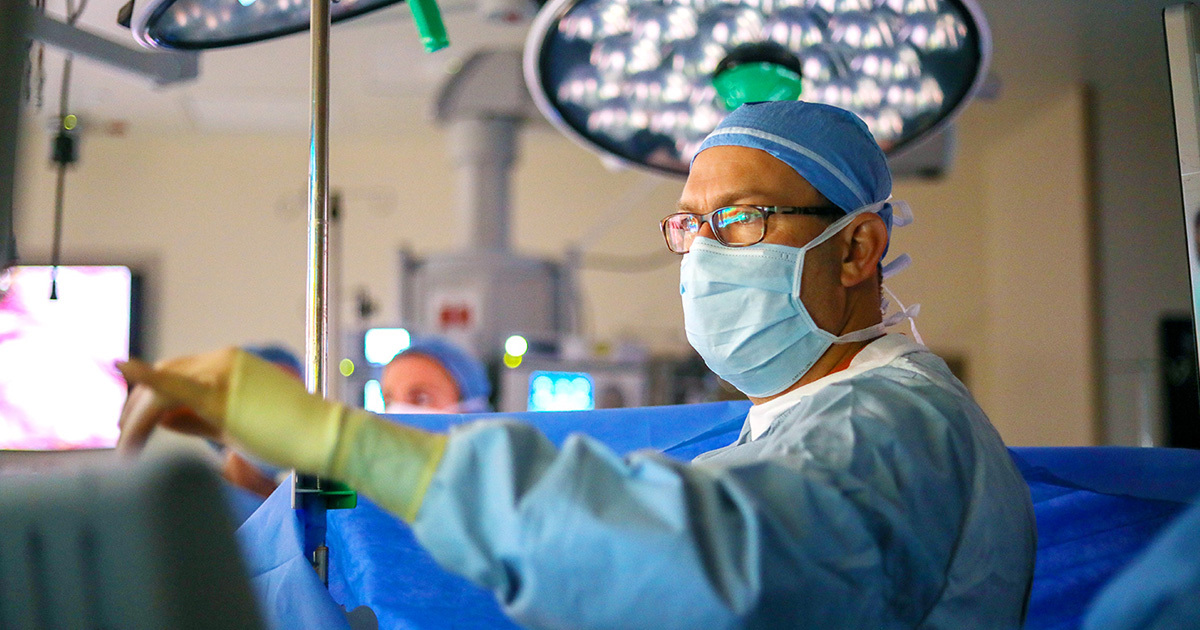About GERD
Gastroesophageal reflux disease (GERD) is a chronic digestive disorder in which acid and bile flow back from the stomach into the esophagus. This backward flow, known as reflux, can cause symptoms such as heartburn, chest discomfort, and indigestion, and over time may damage the lining of the esophagus.
GERD occurs when the lower esophageal sphincter (LES), the valve that normally prevents stomach contents from moving back into the esophagus, becomes weak or relaxes inappropriately. While occasional acid reflux is common, frequent or severe symptoms may require medical evaluation.
At UT Health Austin, we understand that GERD can affect your daily life. Our specialists work to relieve your symptoms and improve your quality of life.
Symptoms of GERD
GERD symptoms can vary from person to person.
Common signs may include:
- Frequent heartburn or a burning sensation in the chest
- Regurgitation of acid or food
- Difficulty swallowing (dysphagia)
- Chronic cough or hoarseness
- Sore throat or a feeling of a lump in the throat
- Indigestion or nausea
Risk Factors for GERD
<br>Certain factors may increase your risk of developing GERD:
- Obesity
- Smoking
- Pregnancy
- Hiatal hernia
- Certain medications (e.g., anti-inflammatory drugs, some blood pressure medications)
- Diets high in fatty, spicy, or acidic foods
Diagnosing GERD
Your physician may use one or more of the following tests to diagnose GERD:
- Upper endoscopy: A thin, flexible tube with a camera examines the esophagus and stomach lining for inflammation, erosions, or other damage.
- Esophageal pH monitoring: Measures acid levels in the esophagus over 24–48 hours.
- Esophageal manometry: Evaluates the function of the lower esophageal sphincter and esophageal muscles.
- Barium swallow: X-rays taken after swallowing a chalky liquid to assess for reflux and structural issues.
Treating GERD
Treatment for GERD typically includes lifestyle changes, medications, and in some cases, surgery.
Lifestyle modifications:
- Lose excess weight
- Raise the head of the bed at night
- Avoid smoking and alcohol
- Limit trigger foods such as fatty, spicy, or acidic meals
Medications:
- Proton Pump Inhibitors (PPIs), such as Prilosec and Nexium, reduce stomach acid and help heal esophageal lining damage.
- PPIs relieve symptoms but do not fix the weakened LES, so reflux may still occur.
Surgical intervention:
- Some patients may require surgery to strengthen the lower esophageal sphincter and prevent reflux.
- After surgery, most patients no longer need long-term medication.
At UT Health Austin, our team develops a personalized treatment plan to manage your GERD effectively, reduce discomfort, and prevent long-term complications.
Care Team Approach
At UT Health Austin, we take a multidisciplinary approach to your care. This means you will benefit from the expertise of multiple specialists across a variety of disciplines caring for you in one place to avoid having to schedule multiple appointments with providers at locations all over the city. The Texas Center for Esophageal and Foregut Surgery care team includes fellowship-trained foregut surgeons, physician assistants, nurse practitioners, dietitians, social workers, and more who work together with gastroenterologists and other specialists to restore digestive and esophageal function and improve your overall well-being.
We collaborate with our colleagues at the Dell Medical School and The University of Texas at Austin to utilize the latest research, diagnostic, and treatment techniques, allowing us to offer state-of-the-art, evidence-based treatment options for foregut conditions. Advanced imaging and lab testing are also available on-site if needed.
Learn More About Your Care Team

Gastroenterology Clinic
Health Transformation Building, 8th Floor
1601 Trinity Street, Bldg. A, Austin, Texas 78712
1-833-UT-CARES (1-833-882-2737)
Get Directions

Texas Center for Esophageal and Foregut Surgery
Health Transformation Building, 8th Floor
1601 Trinity Street, Bldg. A, Austin, Texas 78712
1-512-495-GERD (1-512-495-4373)
Get Directions